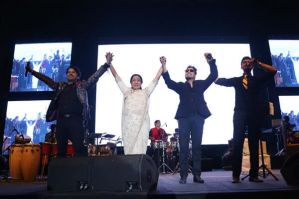Trilok Gurtu - 'Networking has become more important than music, and music has become a side dish like chutney'

If you've been to any of his gigs, you'll surely come out with a special experience that will linger on for more than you expected.
Trilok Gurtu, the eccentric drumming genius, has in a career spanning almost five decades, given many such experiences to thousands and shared stage with the likes of Terje Rypdal, John McLaughlin, Jan Garbarek, Joe Zawinul, Bill Laswell, Maria Jo??o & M??rio Laginha, and Robert Miles. But what is it like to come across a person of his stature? He is certainly not larger than life, but grounded. Not the kind who will play to a lobby, but someone who will speak his mind – be it about music or life
The devout, and one of the most widely traveled musicians from India speaks to radioandmusic.com's Chirag Sutar about music and musicians, the changing trends in the industry, and his new attempt to reach the masses through Massical. Don't think Gurtu is using fancy disco beats to reach a wider audience. Massical is of a spiritual nature – it's for the masses across the globe who connect to that one pulsating beat Read on.
I am told the recent tour that happened in India was after a long gap, what is the reason for you not coming down that often?
Bullshit... I come very often. People here don't come to know because a majority of the concerts here are for corporates or are sponsored, so nobody really knows when I come or go. Another thing is that the organisers here want the artiste to come at a short notice - I don't do that, it's hard for me because I am planned for a year in advance and then people say that Trilok doesn't come.. How can I come? How did I come to Blue Frog? And how did I come back again? In the past, people had spread rumours about my mother that she had stopped singing Because of such rumours, the work meant for that particular musician gets diverted.
Do you find the way music industry works any different here?
Well, it's the same everywhere. One has to do a lot of networking... networking is more than the music and music is a side dish – it has become like �chutney'. I feel ashamed because I don't want to be part of this, I am not here to sit with people, adapting and compromising.
I heard some songs from Massical, and I could hear some Sanskrit shlokas played with African drums...
That was not Sanskrit - and it was not a Shlok but an Aarti (song of praise) of my Sadguru. It's not even African music; it's from Koliwada, the fishermen back here play a generic beat which is also played by the Ganava tribe in Morrocco... Now who should I tell all this to? And who will understand? Only one person who will know is Zakir (Hussain) because he travels.
Do you think Indian musicians should also travel to gain more insight?
Do they have the guts? People here want everything fast, they just want to take the money and leave - it doesn't work like that, my friend. When I go out, people ask me, 'how do you know this (the various sounds)?' I say we have all this... India has everything When I am playing with African musicians, I play on African instruments, it's not that I just know how to play the tabla In my teens, I used to play the drums wherever I found the opportunity – I had that passion, and I was so mad about playing that as I went deeper, I discovered a new style and even now, it's very different. When I worked in India, I had a very tough time – I played Bollywood, I played the garba, I did everything and that's why, I can talk with authority – I have paid my dues very very heavily.
I had attended the concert at Bluefrog and I remember you ended the gig on a very spiritual note...
I love my Sadguru and I aim towards giving good quality music – when I play, I try to give 100 per cent good music. There's no attitude on the stage or show-offs – that is not music, musicians who want to cover up their abilities resort to such tricks. I also talk to every one, catch a taxi, like any normal guy – but India is not ready for all this, they want glamour and show offs – music doesn't need critics and no glamorising
I do my music with an intention to reach the masses with my spirit, but not many understand it because the consciousness has not reached to that level. I am direction-less now... I have no east or west - now everything is round for me – all those perceptions are gone… but it's a very difficult position also.
What do you expect from Massical?
Massical should reach everybody. I am from India, my roots are Indian but I embrace the whole universe and if that's a problem, then there's something wrong with the society here - it will take a long time for people to understand me. I just bow to my Sadguru and try to reach the people, I don't have to reach any Pandit or Ustad, I have to reach the people, and they have to decide... I am bringing it down so that everybody can understand it.
I read in one of your interviews that America is not that great a country to tour ...
You remain a second class citizen there, unless you are going to play for the Indian community or you accept their terms and conditions – which I do not. I left America in 1975, and got chucked out of Berkelee College for Music, and now they are asking me to teach there, but they are very bad paymasters and they put in terms like you have to pay for your visa. What I don't understand is, if an Indian has to go to a foreign land, he has to go through abuse, but it's not the same if a foreigner is coming to India.
Do you plan to teach? Wouldn't you like to pass on your unique way of playing?
No, I just advise. I had a few students here, but they started feeling very proud - I never took money from them, but later I stopped doing that – I don't want that chamchagiri.
You have contributed a lot to world music; do you hope for a Grammy some day?
Firstly, one has to be an American in order to get a Grammy - it's very biased. I had started world music, and also won the Down beat award six times in a row, but the Indian media didn't know then. Today, anything about the Grammy is fodder for front page - people forget about it in one night, and I don't think that one award should be given so much of importance - there's a lot of ignorance about it.














